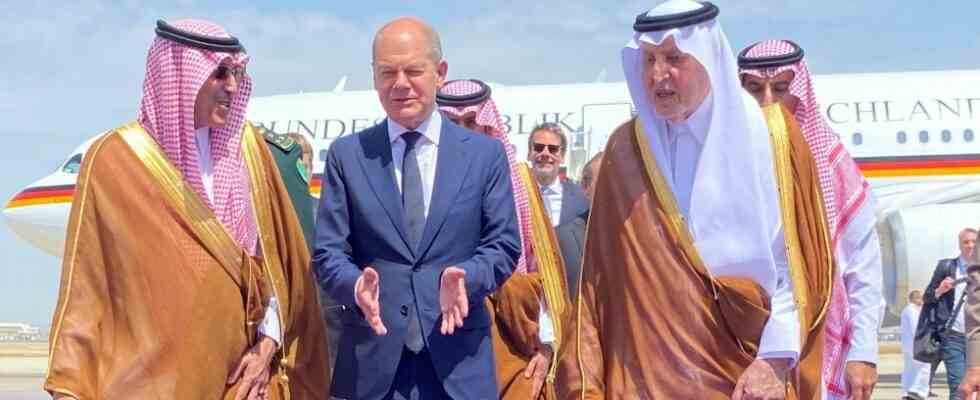Saudi Arabia, Qatar and the Emirates: Chancellor Olaf Scholz does not exactly visit the finest partners. But what is the point of deluding yourself: The three states have the upper hand, because Germany will be dependent on fossil fuels for a long time to come.
The visits to three Gulf States certainly do not belong in the category of political dream trips for Olaf Scholz. It is the reality of Russia’s war of aggression against Ukraine that is forcing the trip to the oil and gas monarchs. The Federal Chancellor must prevent at almost any price that the energy supply in Germany collapses in winter. And if he wants to preserve social peace and not lead the SPD out of government to collapse, he must also ensure that the prices for electricity and heat do not tear society apart or ruin entire branches of industry, as well as the many small and medium-sized businesses that now in existential distress.
Saudi Arabia, the United Arab Emirates and Qatar are among those producers that can increase production in a relatively short period of time. There are few of these in the world, especially not among states that fully share the values of western democracies. Scholz is also acting in close coordination with the Allies in the Gulf: US President Joe Biden, who wanted to make Saudi Arabia the “pariah they are”, has rehabilitated Crown Prince Mohammed bin Salman with a visit, as has French President Emmanuel Macron, who – unlike Berlin – never stopped supplying arms.
Despite glittering facades, a tough surveillance state
It is hardly to be expected that Mohammed bin Salman will be impressed by reminders to respect human rights in his empire as well. He can walk away from being accused of killing Jamal Khashoggi as long as he’s being courted again thanks to the family-owned commodities. In the war in Yemen, Saudi Arabia is now seen as a more constructive actor than the Iran-backed Houthis, who treat the country as a bargaining chip, and rightly so. And that he almost invaded Qatar is almost forgotten.
The Emirates are pioneers of the model of authoritarian stability that they imposed on Egypt and also tried to establish in Libya, and despite glittering facades they are a tough surveillance state. Qatar emerged strengthened from the boycott by its neighbors and, thanks to the West’s withdrawal from Afghanistan, regained its role as an indispensable mediator who maintains contacts with all sides. Doha’s treatment of the workers who built infrastructure and stadiums, despite some legal improvements, comes back into focus with the World Cup.
Hydrogen shows the fossil dinosaurs a way into the future
It is not the finest partners that Germany finds in the Gulf – complementary interests determine the relationships. Officially, the focus is on building a partnership for hydrogen, which could be produced in abundance in the Gulf States thanks to the sun and German technology. In fact, hydrogen shows the fossil dinosaurs a way into the future. And Germany will remain dependent on energy imports for decades to come, even if renewable energies are expanded as quickly as possible and potential savings are exploited, if fracking is allowed and the lifetime of nuclear power plants is extended. New infrastructure for shipping gas, which can later be used for hydrogen, can only be secured with long-term investments and supply agreements. The Gulf States have the lever in their hands.

